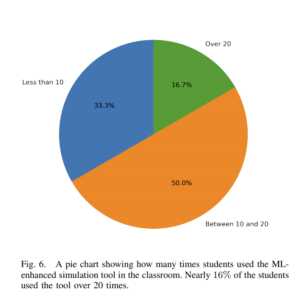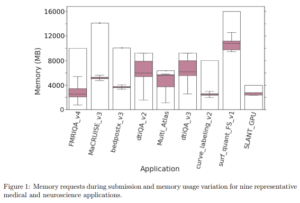In this bimonthly feature, HPCwire highlights newly published research in the high-performance computing community and related domains. From parallel programming to exascale to quantum computing, the details are here.
Running supercomputer simulations of quantum computers
While quantum computers themselves remain in the early prototyping stages, simulations of quantum computers are growing more advanced by the day. This thesis, written by a graduate student at RWTH Aachen University in Germany, discusses the development of a simulator for quantum computers based on superconducting transmon qubits. The author compares simulation results to experiments on the IBM Q Experience, finding “nearly perfect agreement between simulation and experiment[.]”
Author: Dennis Willsch.
 Integrating machine learning with HPC-driven simulations for enhanced student learning
Integrating machine learning with HPC-driven simulations for enhanced student learning
Computational science education can sometimes be difficult due to limited system access or risks to the system in question. These authors, a duo from Indiana University, explore the integration of machine learning with HPC-driven simulations to address these challenges. “We demonstrate that a ML surrogate, designed using artificial neural networks, yields predictions in excellent agreement with explicit simulation, but at far less time and computing costs,” the authors write.
Authors: Vikram Jadhao and JCS Kadupitiya.
Using HPC for large-scale power system simulations
Power grids are notoriously difficult to properly optimize in a timely fashion – and the costs of mismanagement are enormous. This dissertation, written by a doctoral student from RWTH Aachen University, discusses the transition to a smart grid – a transition that will make this process even more demanding – and outlines the use of HPC simulation to prepare grids for complex scenarios.
Author: Lukas Razik.
 Profiling a new generation of HPC applications to prepare for new scheduling techniques
Profiling a new generation of HPC applications to prepare for new scheduling techniques
As HPC, big data and AI continue to converge, applications are becoming increasingly diverse – and increasingly difficult to efficiently schedule. These authors – a team from Vanderbilt University and the University of Bordeaux – describe their approach for better understanding the features and needs of diverse applications to run them more efficiently on HPC systems. Using a neuroscience application as a test subject, they show that their model can run robustly even with very little data.
Authors: Ana Gainaru, Brice Goglin, Valentin Honore and Guillaume Pallez.
Designing underwater robots with supercomputers
In this paper, authors from the South China University of Technology and Guangzhou Shunhai Shipyards apply HPC hydrodynamic simulations to a decidedly cool cause: designing underwater robots. Using computational fluid dynamics, the researchers conducted a simulation of an underwater robot moving at high speeds in order to optimize its ducted propellers, testing different motion styles, rotating speeds and more.
Authors: Yizhe Dou, Jiaming Wu, Haiyan Lv, Xiangxi Han, Peng Dai and Dongjun Chen.
 Detecting cervical cancer on Sunway TaihuLight
Detecting cervical cancer on Sunway TaihuLight
Cervical cancer is one of the most deadly cancers in women around the world. In this paper, a team of researchers from the University of Science and Technology of China use the Sunway TaihuLight supercomputer to implement several distributed deep learning algorithms aimed at rapidly detecting cancerous regions in tissue from cervical cancer biopsies. The researchers achieve parallel efficiency over 80 percent for over a thousand processors, suggesting that the research “reveals the great opportunity for joint combination of deep learning and HPC[.]”
Authors: GuoFeng Lv, MingFan Li, Hong An, Han Lin, Junshi Chen, Wenting Han, Qian Xiao, Fei Wang and Rongfen Lin.
Integrating renewable energy effectively for modern datacenters
The growing sizes and needs of modern datacenters pose enormous energy, financial and carbon costs – but the intermittency of renewable energy sources like solar and wind can make it difficult to integrate them as a major source of energy for datacenters. This paper, written by a team from Leibniz Supercomputing Center (LRZ), introduces a machine learning-based approach that models and forecasts various datacenter energy KPIs, validating the model using several years of data for LRZ and laying a foundation for more dynamic energy management.
Authors: Hayk Shoukourian and Dieter Kranzlmüller.
Do you know about research that should be included in next month’s lists? If so, send us an email at [email protected]. We look forward to hearing from you.





























































